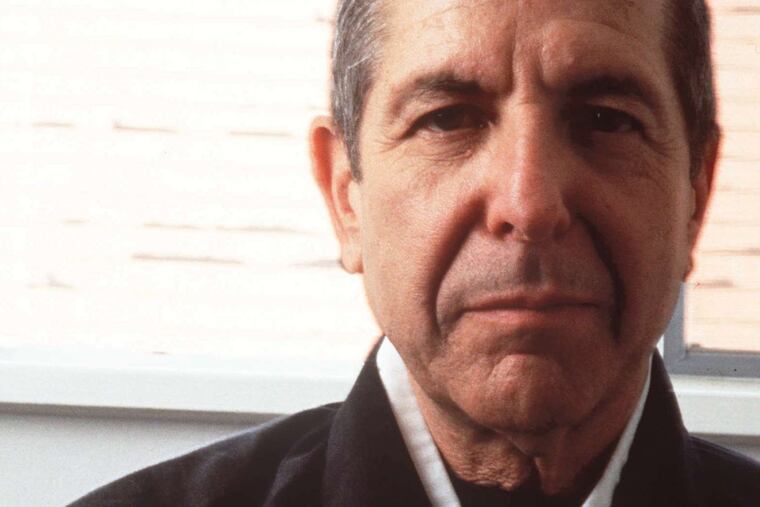Local poets and musicians celebrate the Zen of Leonard Cohen
Ring the bells that still can ring Forget your perfect offering There is a crack, a crack in everything That's how the light gets in.

Ring the bells that still can ring
Forget your perfect offering
There is a crack, a crack in everything
That's how the light gets in.
- Leonard Cohen, "Anthem"
When Leonard Cohen died in November, weeks after releasing his sardonic, soul-stirring You Want It Darker, the focus of his eulogies was naturally on his music, a spiritual, tormented, sensual bounty of recordings (25 albums since 1967).
Yet, it was as a poet that the Canadian-born Cohen became internationally known. His first work was published in 1954 in the literary magazine CIV/n, and his debut book of poems, Let Us Compare Mythologies, came out in 1956. The poems had the same cerebral, self-lacerating, and sexual tint that later characterized his lyrics.
"Other poets, great as they were, seemed safe, shy, tentative in comparison, but Cohen? He was one of us," says Philadelphia poet Leonard Gontarek, who on Tuesday will host a "celebration" of Cohen at West Philadelphia's Green Line Cafe, with more than a dozen locals in letters and in music speaking and singing their tribute to the master. "When he said his search was for a state of grace, he identified what I was looking for also at 18."
In the late '60s, the young Gontarek, carrying Cohen's The Spice-Box of the Earth everywhere ("it fit in my back pocket"), loved that Cohen wrote about women, God, and politics, lived a louche life in Greece, and wore sports coats with dress shirts open at the collar. "We were alike, in the same business or army, so I figured I was halfway there as a poet."
Gontarek finds that Cohen's lyrics make for equally dynamic poetry (" 'The Future' is one of the great political poems"), but there is a difference: "The texts are lonelier, more haunted than the songs. In that austerity, there is the Zen of Leonard Cohen. We can see his pain and sorrow acutely. We can feel more powerfully the demons that pursued him." For Gontarek, it is the difference between the intimate and the universal. "In Cohen's poems, he speaks only to me. In his songs, he speaks to everyone."
Unlike Gontarek, Nathalie Anderson - a teacher of Victorian, modern, and contemporary poetry at Swarthmore College - became acquainted with Cohen in the early '70s through a dinner-party selection of Songs of Love and Hate. "I was arrested by the voice, the mood, the poetry. The rest of the night, that's all we talked about."
She was not moved, however, reading his sexually graphic 1966 novel, Beautiful Losers, or Cohen's poetry. "I did not take to either. Beautiful Losers reminded me of other psychedelic fiction of the time, like Richard Farina's Been Down So Long It Looks Like Up to Me, books where a guy plumbs his misery and women are either mythologized or lie around like furniture . . . too much of a slog. The poetry, too, seemed flat on the page. I was reading compelling contemporary writers at that time - Plath, Hughes. Cohen didn't have their complexity, imagistic intensity, or stylistic verve."
For Anderson, who will read "Joan of Arc" and "Famous Blue Raincoat" at Tuesday's event, it is in his music that Cohen allows the listener to see the cracks in the facade, "to share world-weariness, to determine to devote oneself to music even though we see that the ideal is not just elusive, but ultimately impossible. 'There's a crack in everything,' you know, 'that's where the light enters.' "
Dark folksinger Jon Houlon, who will perform Cohen's "Everybody Knows" as well as a self-penned "Lenny tribute" called "Leonard's Coming Down from the Mountain," is unfamiliar with the poetry, though he believes Cohen's lyrics "have a kind of formalism I associate with poetry."
He adds, "Leonard basically spoke his songs. So whereas others may get away with questionable 'poetry,' Leonard never did. His songs are unadorned and almost have to stand as poems. Plus, I always appreciated Leonard's deep vs. cheap irony."
Philadelphia poet Steve Burke is in between poles when it comes to the poet-or-lyricist question. He'll read a song Cohen covered, "Passing Through," at the event. For him, Cohen's songs are like larger blood vessels, and the poems more like capillaries - "small but where the important things get exchanged," he says.
"Book of Longing is a holy text in my private religion," Burke says of Cohen's 2006 volume of poems. "As intimate as his songs are, these poems are even more so. Naked contemplation. Bone prayers. Genuine offerings of a generous soul. I feel like when I could show someone my copy of Book of Longing, I can say, 'This was given to me by Leonard Cohen.' "